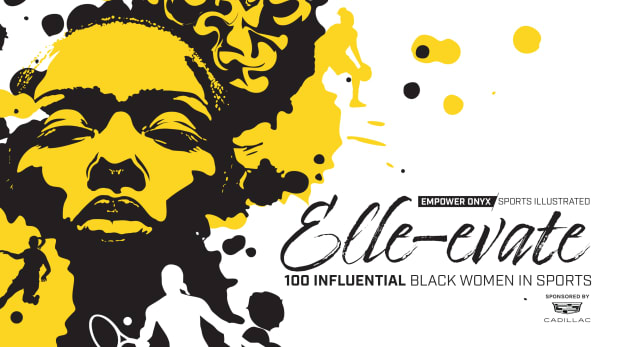The current vice president of ticket sales and services for the team is using her expertise to bring more Black leaders into the sports industry.
Sports Illustrated and Empower Onyx are putting the spotlight on the diverse journeys of Black women across sports—from the veteran athletes, to up-and-coming stars, coaches, executives and more—in the series, Elle-evate: 100 Influential Black Women in Sports.

As the current vice president of ticket sales and services for the Clippers, Krystle Hogan is using her muscle and expertise to continue shaping the legendary team’s fan culture and ensuring Clipper Nation knows they are all family. From her foundational beginnings as a young athlete and basketball fanatic to a veteran career in the industry, Hogan has continued to let her work speak for itself as she expands the entire makeup of what is possible for L.A., all while lifting up the dedicated fan base in the arena. Through her work with the Clippers’ Black Community Alliance and inclusion group LACED UP, she’s also ensured that Black folks and other people of color within the organization have intentional spaces to maintain community. Now, four years into her career, Hogan reflects on the challenges that propelled her forward and her hopes for the future of Black women in the executive athletic industry.
Hogan’s global perspective was cultivated by her father’s career in the Air Force—born in Italy, and raised in Georgia, she grew up obsessively watching local and national sports with her mom, dad and older brother. “It’s funny, I’m in sports now because I grew up playing sports. … I think that’s always just kind of been the thing in our household. If you want to watch TV with everybody in the family, then you are watching sports. It’s just kind of always been a part of our family,” she says.
Though Georgia may seem a little less glamorous than her Italian beginnings, it had one thing you couldn’t find anywhere in Europe: the Georgia Bulldogs. “I am a huge Bulldog fan. I ended up going to the University of Georgia because I’m a huge football fan—and we did just win the national championship,” Hogan says.
Though the sports industry was on her mind pretty much constantly, she found herself working in sales for companies like Marlboro, which took her to Nashville to fine-tune her sales prowess, before she ended up back in Georgia working for the makers of Adderall and Vyvanse. “I think I was really kind of passionate about ADHD and children, and so it was a good opportunity for me to do something I was passionate about,” she recalls. “I really didn’t like the market that I was in. I didn’t feel like I was fulfilled, not like working in sports.”
Her time back home proved to be a necessary moment of stability and regrounding, preparing for what was to come, though she didn’t know it yet. After a few years, Hogan was uprooting and transporting her entire life across the entire country to California to finally begin her career in the sports industry. “One day I just kind of started looking. I don’t even remember applying, but I got a call from the San Diego Padres, and I was like, ‘O.K., this is interesting, but I’ve never moved across the country.’ And to go to San Diego? So, I went out there like I went on vacation,” she remembers. “I was going to the zoo and all of these things. My interview was the last day, and the next day I’m flying home, and they call and offer me a job. That was the start of my career in sports—I worked for the Padres for about seven years.”
Hogan spent her time gradually working up through sales, accounts and membership services, under the leadership of industry veteran Jason Green, who spent six seasons with the Padres before becoming the Clippers’ chief ticketing officer. He saw something in Hogan he couldn’t do without. “I got to meet some great people, and work under some really great leadership over my time with the Padres. One major person being my current boss, Jason Green. He was someone that recruited me to the Padres and was a leader for me over there. Then, when he got an opportunity with L.A., he gave me a call. It was really a hard offer to refuse—so I didn’t. Back in 2018, I took the job with the Clippers as director of service and retention.”
Not even two years into her position, Hogan was promoted to her current role. Again, it was a case of her work speaking for itself as she proved herself indispensable to the organization. But she admits that tangible examples of what she could do professionally when she was younger, especially as a Black woman in the white-male dominated executive industry, were few and far between.
“Jason has always been a mentor for me, and when I came over to the Clippers, he would always talk about how I could be a VP, like ‘this is something that you could do.’ I just never thought about it because I hadn’t seen it. In my role, one of the things that I’m passionate about is leadership growth. Especially leadership growth for women and for people of color. So much of it is lack of education—if I look back to when I was coming right out of college, I didn’t know about sales. I thought if you were in sports, you were playing. I never thought of the business side of it,” Hogan says.
As the organization gets ready for one of its biggest undertakings to date—the launch of its new arena, the Intuit Dome in Inglewood—Hogan is busy at best. But she’s grateful to be in the trenches of Clipper Nation with her sports family. “People always want to know, what makes you stay? It’s the people that I’ve had the opportunity to meet. … I’ve developed friendships that I will have long after my time and tenure with the Clippers. This job can be hard sometimes and so with that being said, having a good support system and people to lean on, that’s really one of the things that I enjoy. I’ve made some really strong friendships during my time with the Clippers,” she says.
Through her work with the Black Clippers Association, and programs like LACED UP, Hogan is continuing to find ways to bridge the gap and dismantle power structures that are gatekeeping the sports industry, especially for Black women. “It’s really just kind of been an opportunity for us to come in together, talk about the issues that we’re facing in the industry [and] in our organization, as well as in the world,” Hogan says. “It gives us an opportunity just to connect with people that we wouldn’t usually on a day-to-day if you’re in different departments. Long term, that’s really kind of been the feedback that I’ve gotten—it’s about the connection piece. … As long as we’re talking and the organization’s listening, then I think it’s successful. We just have to continue to do that.”

Naya Samuel is a contributor for Empower Onyx, a diverse multi-channel platform celebrating the stories and transformative power of sports for Black women and girls.